Abnormal Psychology: Exploring Mindfulness-Based Cognitive Therapy
VerifiedAdded on 2021/11/16
|5
|1173
|71
Essay
AI Summary
This essay delves into the realm of abnormal psychology, examining the nature of mental health and the various approaches to understanding and treating psychological disorders. It specifically focuses on Mindfulness-Based Cognitive Therapy (MBCT) as a therapeutic intervention for depression. The essay traces the historical context of abnormal behaviors, highlighting the shift from supernatural explanations to scientific inquiry. It then provides a detailed explanation of MBCT, its origins, and its mechanisms, including the use of cognitive behavioral therapy techniques. The essay also discusses the effects of MBCT on depression, citing research findings and meta-analyses that support its effectiveness, particularly for individuals with a history of recurrent depressive episodes. Finally, the essay concludes by emphasizing the importance of treating individuals with mental illnesses with care and understanding.
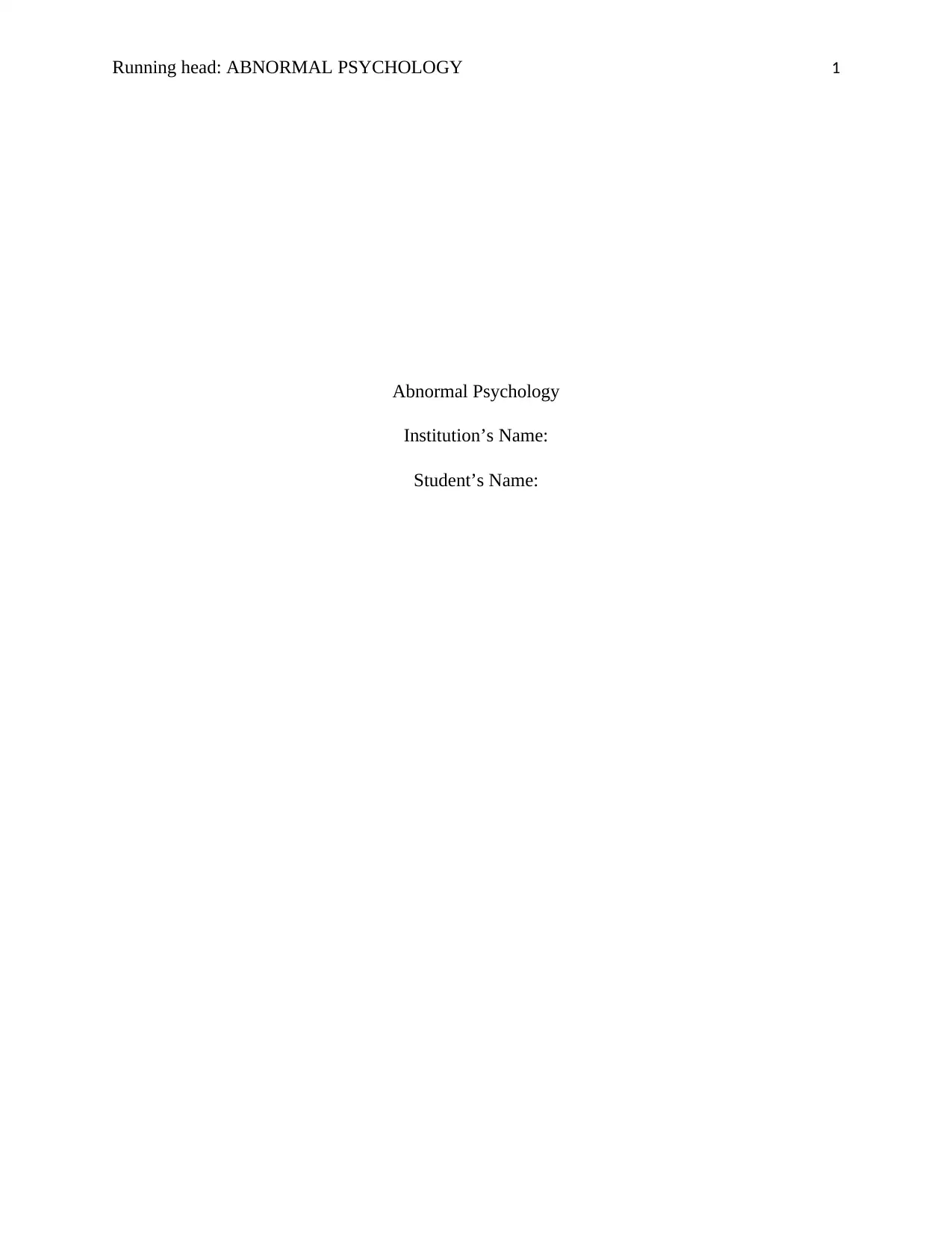
Running head: ABNORMAL PSYCHOLOGY 1
Abnormal Psychology
Institution’s Name:
Student’s Name:
Abnormal Psychology
Institution’s Name:
Student’s Name:
Paraphrase This Document
Need a fresh take? Get an instant paraphrase of this document with our AI Paraphraser
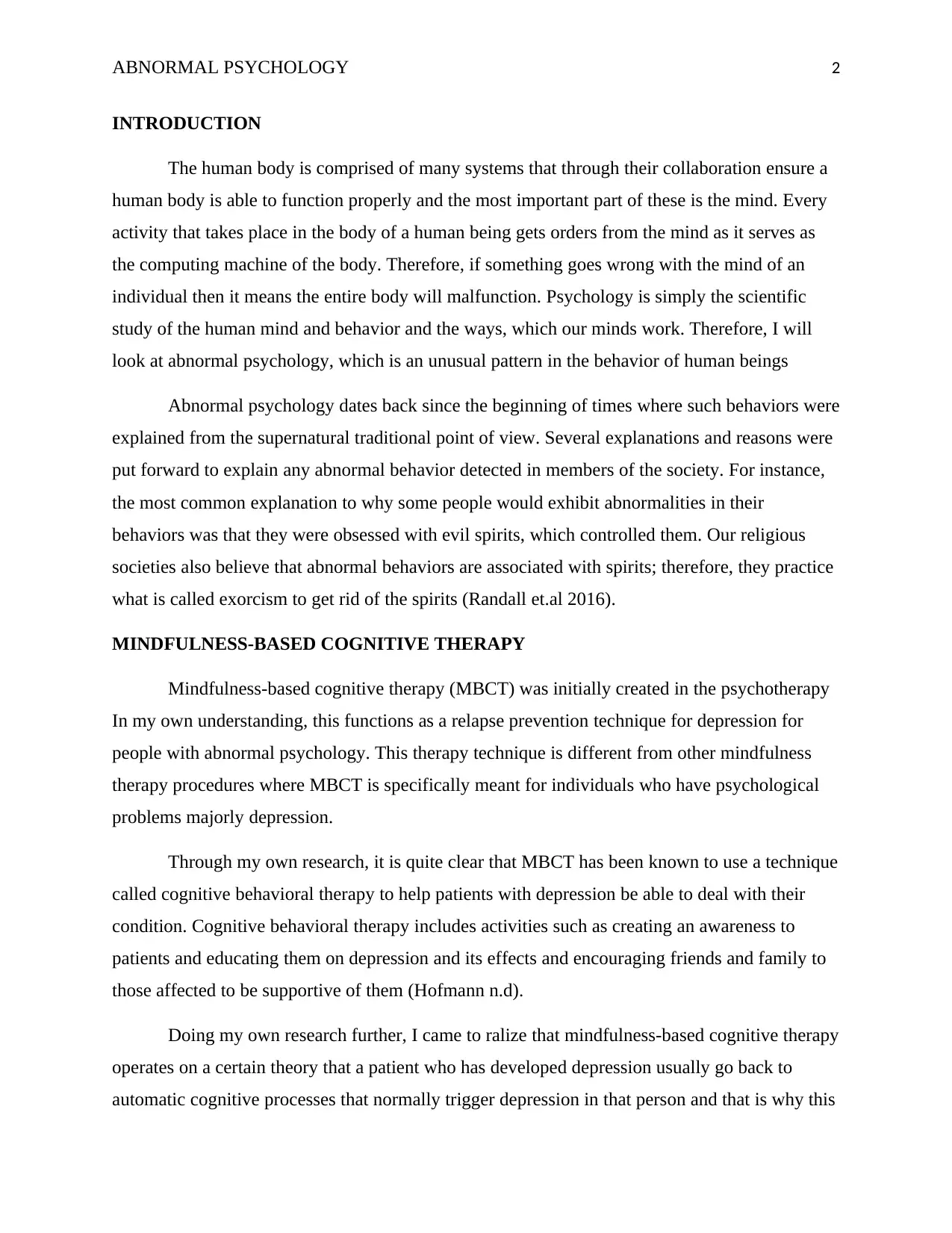
ABNORMAL PSYCHOLOGY 2
INTRODUCTION
The human body is comprised of many systems that through their collaboration ensure a
human body is able to function properly and the most important part of these is the mind. Every
activity that takes place in the body of a human being gets orders from the mind as it serves as
the computing machine of the body. Therefore, if something goes wrong with the mind of an
individual then it means the entire body will malfunction. Psychology is simply the scientific
study of the human mind and behavior and the ways, which our minds work. Therefore, I will
look at abnormal psychology, which is an unusual pattern in the behavior of human beings
Abnormal psychology dates back since the beginning of times where such behaviors were
explained from the supernatural traditional point of view. Several explanations and reasons were
put forward to explain any abnormal behavior detected in members of the society. For instance,
the most common explanation to why some people would exhibit abnormalities in their
behaviors was that they were obsessed with evil spirits, which controlled them. Our religious
societies also believe that abnormal behaviors are associated with spirits; therefore, they practice
what is called exorcism to get rid of the spirits (Randall et.al 2016).
MINDFULNESS-BASED COGNITIVE THERAPY
Mindfulness-based cognitive therapy (MBCT) was initially created in the psychotherapy
In my own understanding, this functions as a relapse prevention technique for depression for
people with abnormal psychology. This therapy technique is different from other mindfulness
therapy procedures where MBCT is specifically meant for individuals who have psychological
problems majorly depression.
Through my own research, it is quite clear that MBCT has been known to use a technique
called cognitive behavioral therapy to help patients with depression be able to deal with their
condition. Cognitive behavioral therapy includes activities such as creating an awareness to
patients and educating them on depression and its effects and encouraging friends and family to
those affected to be supportive of them (Hofmann n.d).
Doing my own research further, I came to ralize that mindfulness-based cognitive therapy
operates on a certain theory that a patient who has developed depression usually go back to
automatic cognitive processes that normally trigger depression in that person and that is why this
INTRODUCTION
The human body is comprised of many systems that through their collaboration ensure a
human body is able to function properly and the most important part of these is the mind. Every
activity that takes place in the body of a human being gets orders from the mind as it serves as
the computing machine of the body. Therefore, if something goes wrong with the mind of an
individual then it means the entire body will malfunction. Psychology is simply the scientific
study of the human mind and behavior and the ways, which our minds work. Therefore, I will
look at abnormal psychology, which is an unusual pattern in the behavior of human beings
Abnormal psychology dates back since the beginning of times where such behaviors were
explained from the supernatural traditional point of view. Several explanations and reasons were
put forward to explain any abnormal behavior detected in members of the society. For instance,
the most common explanation to why some people would exhibit abnormalities in their
behaviors was that they were obsessed with evil spirits, which controlled them. Our religious
societies also believe that abnormal behaviors are associated with spirits; therefore, they practice
what is called exorcism to get rid of the spirits (Randall et.al 2016).
MINDFULNESS-BASED COGNITIVE THERAPY
Mindfulness-based cognitive therapy (MBCT) was initially created in the psychotherapy
In my own understanding, this functions as a relapse prevention technique for depression for
people with abnormal psychology. This therapy technique is different from other mindfulness
therapy procedures where MBCT is specifically meant for individuals who have psychological
problems majorly depression.
Through my own research, it is quite clear that MBCT has been known to use a technique
called cognitive behavioral therapy to help patients with depression be able to deal with their
condition. Cognitive behavioral therapy includes activities such as creating an awareness to
patients and educating them on depression and its effects and encouraging friends and family to
those affected to be supportive of them (Hofmann n.d).
Doing my own research further, I came to ralize that mindfulness-based cognitive therapy
operates on a certain theory that a patient who has developed depression usually go back to
automatic cognitive processes that normally trigger depression in that person and that is why this
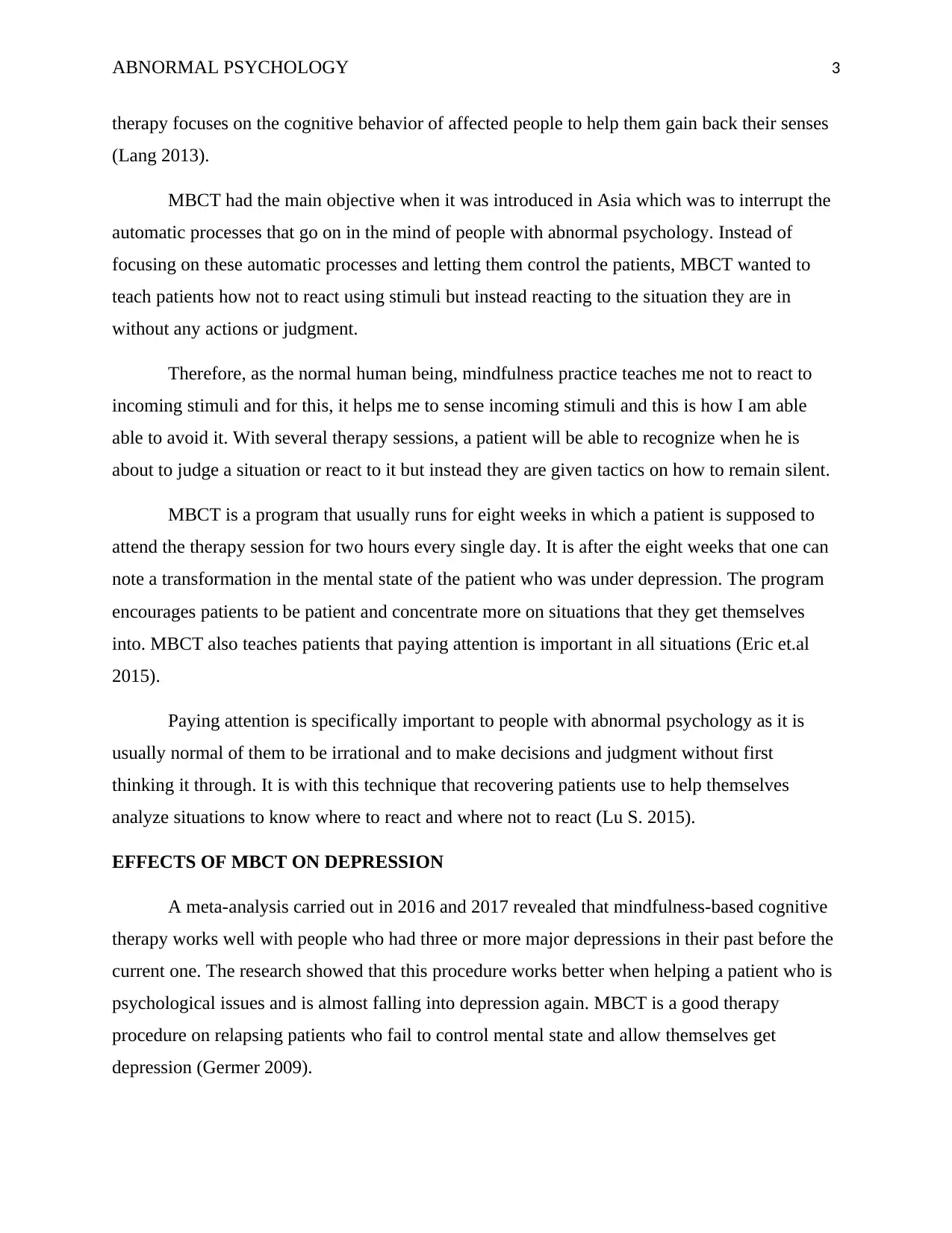
ABNORMAL PSYCHOLOGY 3
therapy focuses on the cognitive behavior of affected people to help them gain back their senses
(Lang 2013).
MBCT had the main objective when it was introduced in Asia which was to interrupt the
automatic processes that go on in the mind of people with abnormal psychology. Instead of
focusing on these automatic processes and letting them control the patients, MBCT wanted to
teach patients how not to react using stimuli but instead reacting to the situation they are in
without any actions or judgment.
Therefore, as the normal human being, mindfulness practice teaches me not to react to
incoming stimuli and for this, it helps me to sense incoming stimuli and this is how I am able
able to avoid it. With several therapy sessions, a patient will be able to recognize when he is
about to judge a situation or react to it but instead they are given tactics on how to remain silent.
MBCT is a program that usually runs for eight weeks in which a patient is supposed to
attend the therapy session for two hours every single day. It is after the eight weeks that one can
note a transformation in the mental state of the patient who was under depression. The program
encourages patients to be patient and concentrate more on situations that they get themselves
into. MBCT also teaches patients that paying attention is important in all situations (Eric et.al
2015).
Paying attention is specifically important to people with abnormal psychology as it is
usually normal of them to be irrational and to make decisions and judgment without first
thinking it through. It is with this technique that recovering patients use to help themselves
analyze situations to know where to react and where not to react (Lu S. 2015).
EFFECTS OF MBCT ON DEPRESSION
A meta-analysis carried out in 2016 and 2017 revealed that mindfulness-based cognitive
therapy works well with people who had three or more major depressions in their past before the
current one. The research showed that this procedure works better when helping a patient who is
psychological issues and is almost falling into depression again. MBCT is a good therapy
procedure on relapsing patients who fail to control mental state and allow themselves get
depression (Germer 2009).
therapy focuses on the cognitive behavior of affected people to help them gain back their senses
(Lang 2013).
MBCT had the main objective when it was introduced in Asia which was to interrupt the
automatic processes that go on in the mind of people with abnormal psychology. Instead of
focusing on these automatic processes and letting them control the patients, MBCT wanted to
teach patients how not to react using stimuli but instead reacting to the situation they are in
without any actions or judgment.
Therefore, as the normal human being, mindfulness practice teaches me not to react to
incoming stimuli and for this, it helps me to sense incoming stimuli and this is how I am able
able to avoid it. With several therapy sessions, a patient will be able to recognize when he is
about to judge a situation or react to it but instead they are given tactics on how to remain silent.
MBCT is a program that usually runs for eight weeks in which a patient is supposed to
attend the therapy session for two hours every single day. It is after the eight weeks that one can
note a transformation in the mental state of the patient who was under depression. The program
encourages patients to be patient and concentrate more on situations that they get themselves
into. MBCT also teaches patients that paying attention is important in all situations (Eric et.al
2015).
Paying attention is specifically important to people with abnormal psychology as it is
usually normal of them to be irrational and to make decisions and judgment without first
thinking it through. It is with this technique that recovering patients use to help themselves
analyze situations to know where to react and where not to react (Lu S. 2015).
EFFECTS OF MBCT ON DEPRESSION
A meta-analysis carried out in 2016 and 2017 revealed that mindfulness-based cognitive
therapy works well with people who had three or more major depressions in their past before the
current one. The research showed that this procedure works better when helping a patient who is
psychological issues and is almost falling into depression again. MBCT is a good therapy
procedure on relapsing patients who fail to control mental state and allow themselves get
depression (Germer 2009).
⊘ This is a preview!⊘
Do you want full access?
Subscribe today to unlock all pages.

Trusted by 1+ million students worldwide
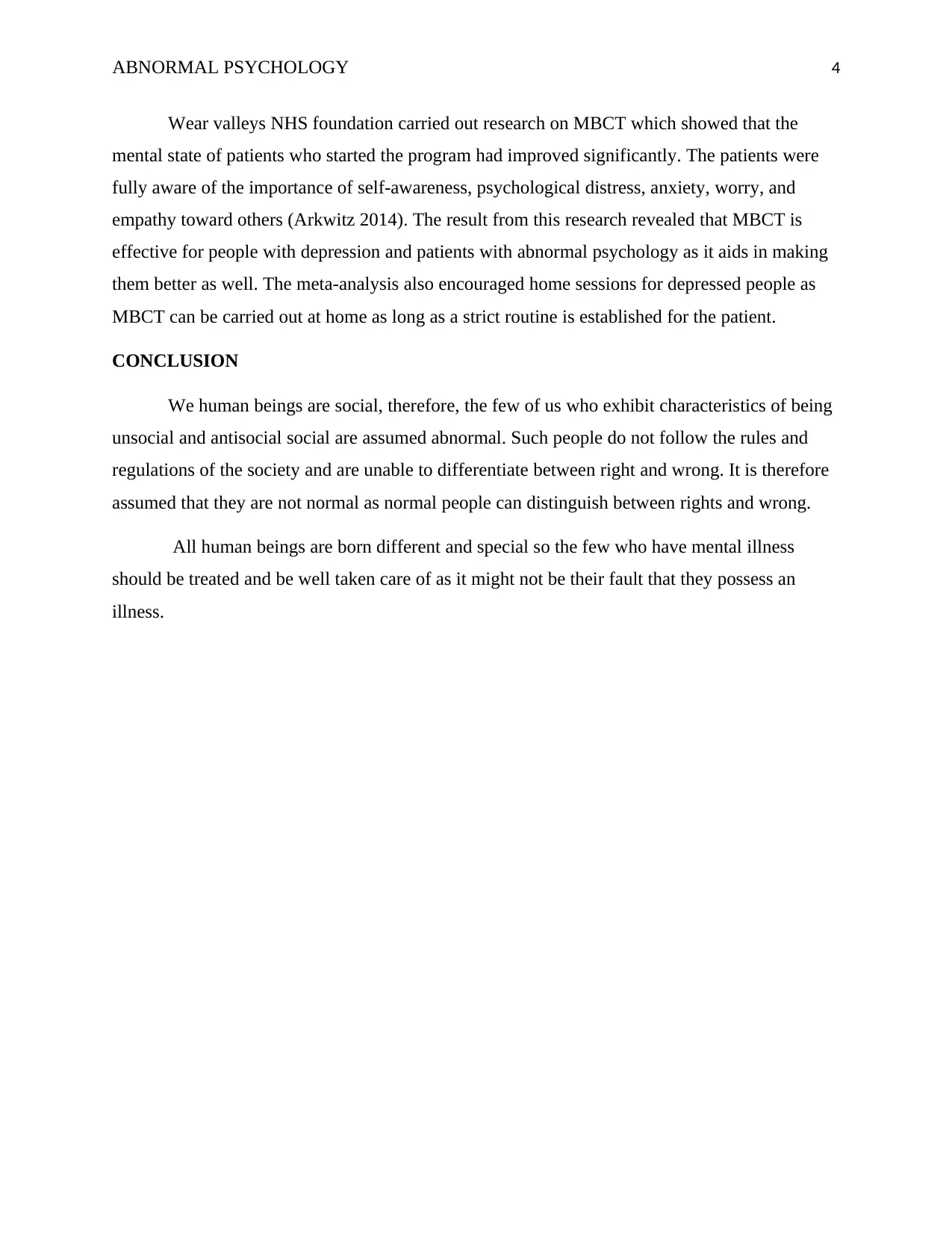
ABNORMAL PSYCHOLOGY 4
Wear valleys NHS foundation carried out research on MBCT which showed that the
mental state of patients who started the program had improved significantly. The patients were
fully aware of the importance of self-awareness, psychological distress, anxiety, worry, and
empathy toward others (Arkwitz 2014). The result from this research revealed that MBCT is
effective for people with depression and patients with abnormal psychology as it aids in making
them better as well. The meta-analysis also encouraged home sessions for depressed people as
MBCT can be carried out at home as long as a strict routine is established for the patient.
CONCLUSION
We human beings are social, therefore, the few of us who exhibit characteristics of being
unsocial and antisocial social are assumed abnormal. Such people do not follow the rules and
regulations of the society and are unable to differentiate between right and wrong. It is therefore
assumed that they are not normal as normal people can distinguish between rights and wrong.
All human beings are born different and special so the few who have mental illness
should be treated and be well taken care of as it might not be their fault that they possess an
illness.
Wear valleys NHS foundation carried out research on MBCT which showed that the
mental state of patients who started the program had improved significantly. The patients were
fully aware of the importance of self-awareness, psychological distress, anxiety, worry, and
empathy toward others (Arkwitz 2014). The result from this research revealed that MBCT is
effective for people with depression and patients with abnormal psychology as it aids in making
them better as well. The meta-analysis also encouraged home sessions for depressed people as
MBCT can be carried out at home as long as a strict routine is established for the patient.
CONCLUSION
We human beings are social, therefore, the few of us who exhibit characteristics of being
unsocial and antisocial social are assumed abnormal. Such people do not follow the rules and
regulations of the society and are unable to differentiate between right and wrong. It is therefore
assumed that they are not normal as normal people can distinguish between rights and wrong.
All human beings are born different and special so the few who have mental illness
should be treated and be well taken care of as it might not be their fault that they possess an
illness.
Paraphrase This Document
Need a fresh take? Get an instant paraphrase of this document with our AI Paraphraser
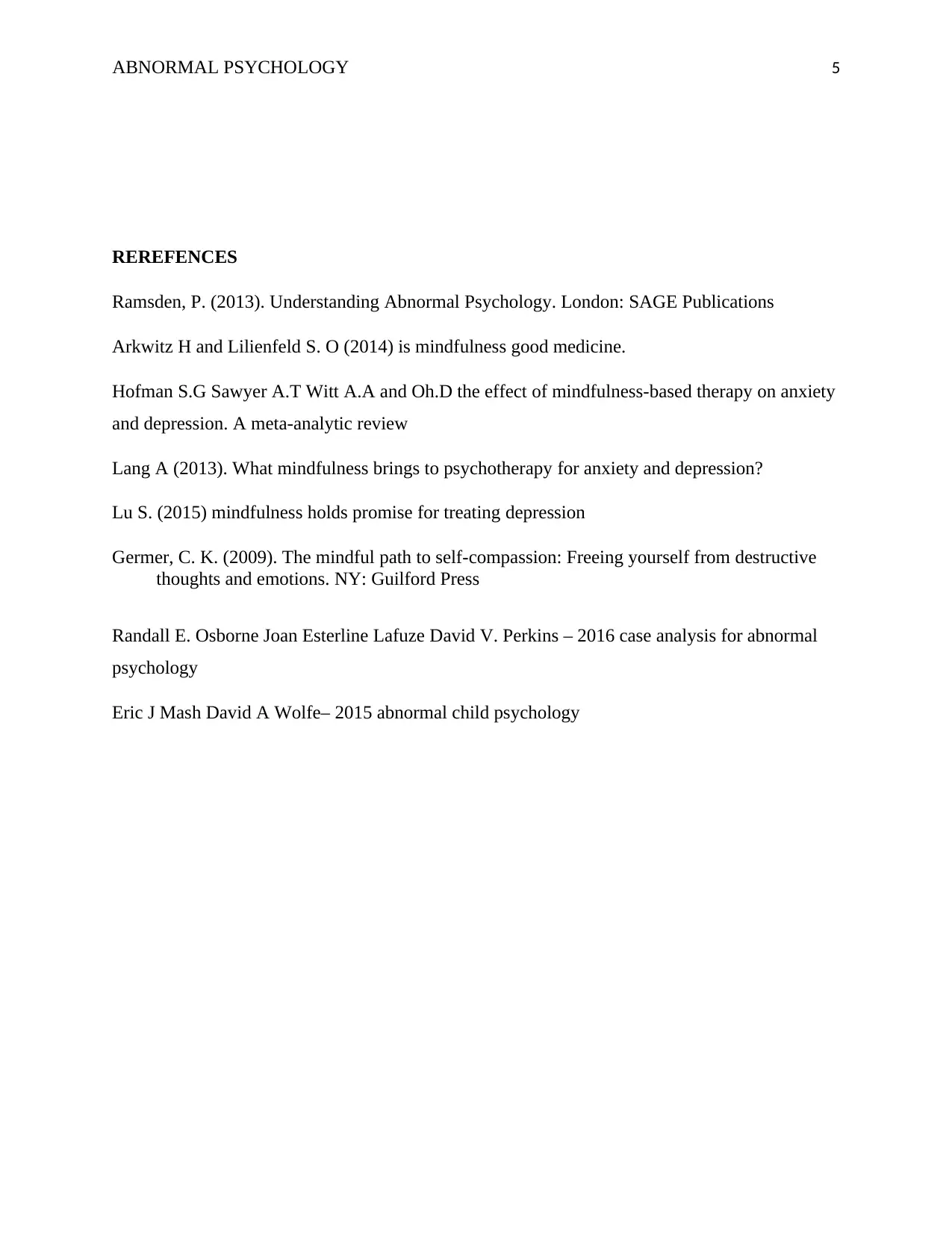
ABNORMAL PSYCHOLOGY 5
REREFENCES
Ramsden, P. (2013). Understanding Abnormal Psychology. London: SAGE Publications
Arkwitz H and Lilienfeld S. O (2014) is mindfulness good medicine.
Hofman S.G Sawyer A.T Witt A.A and Oh.D the effect of mindfulness-based therapy on anxiety
and depression. A meta-analytic review
Lang A (2013). What mindfulness brings to psychotherapy for anxiety and depression?
Lu S. (2015) mindfulness holds promise for treating depression
Germer, C. K. (2009). The mindful path to self-compassion: Freeing yourself from destructive
thoughts and emotions. NY: Guilford Press
Randall E. Osborne Joan Esterline Lafuze David V. Perkins – 2016 case analysis for abnormal
psychology
Eric J Mash David A Wolfe– 2015 abnormal child psychology
REREFENCES
Ramsden, P. (2013). Understanding Abnormal Psychology. London: SAGE Publications
Arkwitz H and Lilienfeld S. O (2014) is mindfulness good medicine.
Hofman S.G Sawyer A.T Witt A.A and Oh.D the effect of mindfulness-based therapy on anxiety
and depression. A meta-analytic review
Lang A (2013). What mindfulness brings to psychotherapy for anxiety and depression?
Lu S. (2015) mindfulness holds promise for treating depression
Germer, C. K. (2009). The mindful path to self-compassion: Freeing yourself from destructive
thoughts and emotions. NY: Guilford Press
Randall E. Osborne Joan Esterline Lafuze David V. Perkins – 2016 case analysis for abnormal
psychology
Eric J Mash David A Wolfe– 2015 abnormal child psychology
1 out of 5
Related Documents
Your All-in-One AI-Powered Toolkit for Academic Success.
+13062052269
info@desklib.com
Available 24*7 on WhatsApp / Email
![[object Object]](/_next/static/media/star-bottom.7253800d.svg)
Unlock your academic potential
Copyright © 2020–2026 A2Z Services. All Rights Reserved. Developed and managed by ZUCOL.



